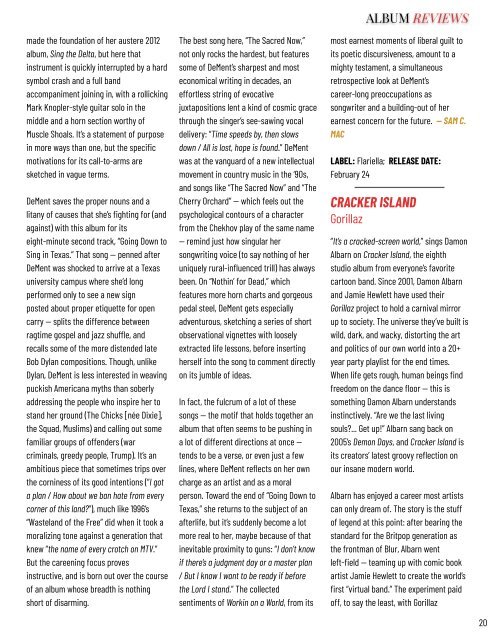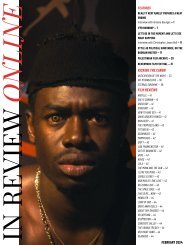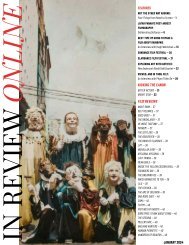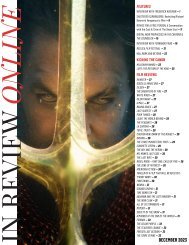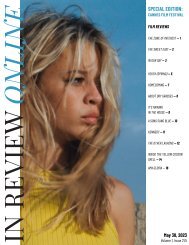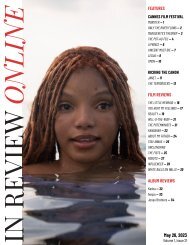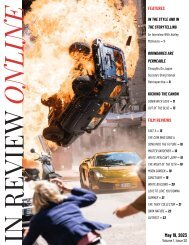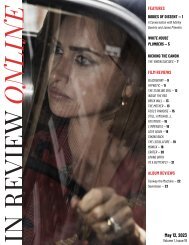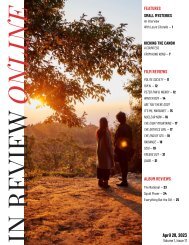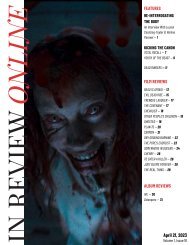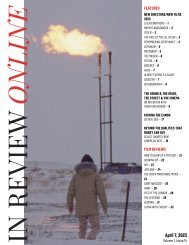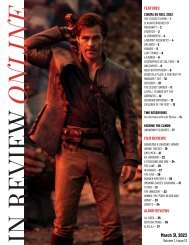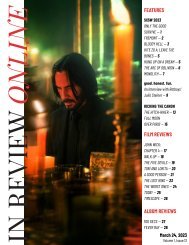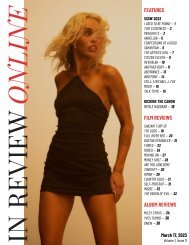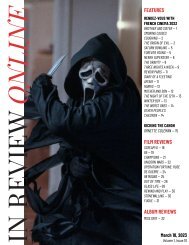You also want an ePaper? Increase the reach of your titles
YUMPU automatically turns print PDFs into web optimized ePapers that Google loves.
made the foundation of her austere 2012<br />
album, Sing the Delta, but here that<br />
instrument is quickly interrupted by a hard<br />
symbol crash and a full band<br />
accompaniment joining in, with a rollicking<br />
Mark Knopler-style guitar solo in the<br />
middle and a horn section worthy of<br />
Muscle Shoals. It’s a statement of purpose<br />
in more ways than one, but the specific<br />
motivations for its call-to-arms are<br />
sketched in vague terms.<br />
DeMent saves the proper nouns and a<br />
litany of causes that she’s fighting for (and<br />
against) with this album for its<br />
eight-minute second track, “Going Down to<br />
Sing in Texas.” That song <strong>—</strong> penned after<br />
DeMent was shocked to arrive at a Texas<br />
university campus where she’d long<br />
performed only to see a new sign<br />
posted about proper etiquette for open<br />
carry <strong>—</strong> splits the difference between<br />
ragtime gospel and jazz shuffle, and<br />
recalls some of the more distended late<br />
Bob Dylan compositions. Though, unlike<br />
Dylan, DeMent is less interested in weaving<br />
puckish Americana myths than soberly<br />
addressing the people who inspire her to<br />
stand her ground (The Chicks [née Dixie],<br />
the Squad, Muslims) and calling out some<br />
familiar groups of offenders (war<br />
criminals, greedy people, Trump). It’s an<br />
ambitious piece that sometimes trips over<br />
the corniness of its good intentions (“I got<br />
a plan / How about we ban hate from every<br />
corner of this land?”), much like 1996’s<br />
“Wasteland of the Free” did when it took a<br />
moralizing tone against a generation that<br />
knew “the name of every crotch on MTV.”<br />
But the careening focus proves<br />
instructive, and is born out over the course<br />
of an album whose breadth is nothing<br />
short of disarming.<br />
The best song here, “The Sacred Now,”<br />
not only rocks the hardest, but features<br />
some of DeMent’s sharpest and most<br />
economical writing in decades, an<br />
effortless string of evocative<br />
juxtapositions lent a kind of cosmic grace<br />
through the singer’s see-sawing vocal<br />
delivery: “Time speeds by, then slows<br />
down / All is lost, hope is found.” DeMent<br />
was at the vanguard of a new intellectual<br />
movement in country music in the ‘90s,<br />
and songs like “The Sacred Now” and “The<br />
Cherry Orchard” <strong>—</strong> which feels out the<br />
psychological contours of a character<br />
from the Chekhov play of the same name<br />
<strong>—</strong> remind just how singular her<br />
songwriting voice (to say nothing of her<br />
uniquely rural-influenced trill) has always<br />
been. On “Nothin’ for Dead,” which<br />
features more horn charts and gorgeous<br />
pedal steel, DeMent gets especially<br />
adventurous, sketching a series of short<br />
observational vignettes with loosely<br />
extracted life lessons, before inserting<br />
herself into the song to comment directly<br />
on its jumble of ideas.<br />
In fact, the fulcrum of a lot of these<br />
songs <strong>—</strong> the motif that holds together an<br />
album that often seems to be pushing in<br />
a lot of different directions at once <strong>—</strong><br />
tends to be a verse, or even just a few<br />
lines, where DeMent reflects on her own<br />
charge as an artist and as a moral<br />
person. Toward the end of “Going Down to<br />
Texas,” she returns to the subject of an<br />
afterlife, but it’s suddenly become a lot<br />
more real to her, maybe because of that<br />
inevitable proximity to guns: “I don’t know<br />
if there’s a judgment day or a master plan<br />
/ But I know I want to be ready if before<br />
the Lord I stand.” The collected<br />
sentiments of Workin on a World, from its<br />
ALBUM REVIEWS<br />
most earnest moments of liberal guilt to<br />
its poetic discursiveness, amount to a<br />
mighty testament, a simultaneous<br />
retrospective look at DeMent’s<br />
career-long preoccupations as<br />
songwriter and a building-out of her<br />
earnest concern for the future. <strong>—</strong> SAM C.<br />
MAC<br />
LABEL: Flariella; RELEASE DATE:<br />
February 24<br />
CRACKER ISLAND<br />
Gorillaz<br />
“It’s a cracked-screen world,” sings Damon<br />
Albarn on Cracker Island, the eighth<br />
studio album from everyone’s favorite<br />
cartoon band. Since 2001, Damon Albarn<br />
and Jamie Hewlett have used their<br />
Gorillaz project to hold a carnival mirror<br />
up to society. The universe they’ve built is<br />
wild, dark, and wacky, distorting the art<br />
and politics of our own world into a 20+<br />
year party playlist for the end times.<br />
When life gets rough, human beings find<br />
freedom on the dance floor <strong>—</strong> this is<br />
something Damon Albarn understands<br />
instinctively. “Are we the last living<br />
souls?... Get up!” Albarn sang back on<br />
2005’s Demon Days, and Cracker Island is<br />
its creators’ latest groovy reflection on<br />
our insane modern world.<br />
Albarn has enjoyed a career most artists<br />
can only dream of. The story is the stuff<br />
of legend at this point: after bearing the<br />
standard for the Britpop generation as<br />
the frontman of Blur, Albarn went<br />
left-field <strong>—</strong> teaming up with comic book<br />
artist Jamie Hewlett to create the world’s<br />
first “virtual band.” The experiment paid<br />
off, to say the least, with Gorillaz<br />
20


